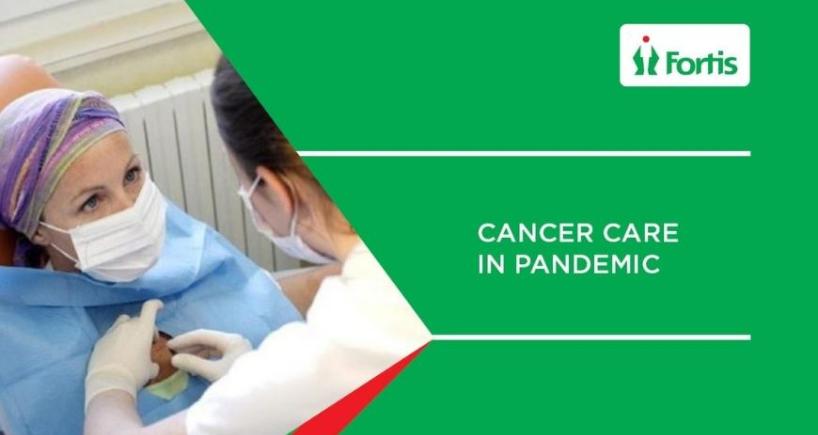
Cancer Care during the Pandemic
COVID 19 outbreak was declared as a pandemic by the WHO on 11th March 2020 and since then life has never been the same for most of us. The onset of the second wave has shown that things may not be settling down any time soon and we may have to learn to live with the virus for some time.
Healthcare has been the worst affected as the number of patients requiring treatment for COVID 19 continues to increase steadily with resources being diverted for the same. This has profoundly impacted the care of other “non-COVID” patients who have been struggling to get treatment for their diseases. Cancer patients have also been affected for many reasons. Firstly, if diagnosis and treatment of cancer is delayed, it may upstage the disease leading to poorer outcomes. Secondly, treatment of cancer using various drugs including chemotherapy may lead to a lower immunity and a greater susceptibility to effects of COVID -19. Various preliminary studies have shown an increase in severe complications and deaths with COVID in cancer patients. Finally, cancer patients need to regularly travel and visit hospitals for their ongoing treatment putting them at an increased risk of exposure to the virus.
Who is at most risk?
- Patients suffering from blood cancers.
- Patients who are on active treatment with chemotherapy or radiotherapy or have received chemotherapy within the last three months.
- Patients who have undergone bone marrow transplant or stem cell transplant in the last six months or are still taking drugs for immunosuppression.
As treatment of cancer must not be delayed or compromised for the sake of best results, it is important to understand a few precautions one can take to minimize the risk of “catching” COVID.
- Wear a mask PROPERLY. Mask is the only protection against COVID once you step out of your home. The mask should cover your nose and mouth at all times. DO NOT keep touching or adjusting your mask. This also goes for the caregivers of cancer patients as they can also carry the virus to their loved ones if they get infected.
- DO NOT step out of the house unless absolutely necessary. Avoid crowded and closed places. Open spaces with good ventilation have less risk of virus transmission.
- Hand hygiene. Both patient and their care-givers should make sure they wash their hands thoroughly and regularly.
- Try to remain isolated within the house if possible. Wear a mask in the house if possible.
- Curtail the number of visitors. The more number of people you meet, the more the risk of getting infected.
- When in hospital for treatment, restrict your movements within the hospital to OPD and/or treatment center only. Avoid cafeterias. Get a packed lunch or snack from home if food is not provided.
- Tele consultation. Most doctors are doing online consultations in these times. Try to use this facility where possible so you can avoid travel.
- Understand about the symptoms of COVID. Immediately inform your doctor if you or your family member develop, sore throat, cough, congestion or runny nose, fever, bodyache, loss of taste or smell, shortness of breath. In case of such symptoms do not come to OPD but come to the ER where isolation facilities are in place.
COVID vaccination in cancer patients.
In India currently two vaccines are available - The AstraZeneca / serum institute ChAdOx1 nCoV-19 vaccine (Covishield) and the Bharat biotech inactivated SARS-CoV-2 vaccine, BBV152 (Covaxin). Both the vaccines have shown safety and efficacy in clinical trials. However, most clinical trial patients have not included patients with cancer. So limited data are available regarding the safety and efficacy of these vaccines in cancer-afflicted patients.
There is a concern about using live vaccines in patients with low immunity. However, none of these are live vaccines. The other concern is whether these patients will mount any immune response to the vaccine in view of their compromised immune status.
Due to the increased risk of severe illness and mortality due to COVID in cancer patients it is recommended that all cancer patients above the age of 18 years should get vaccinated against COVID. The schedule of vaccine will depend on the kind of cancer and the types of chemotherapy. It is advisable to consult your oncologist before going for vaccination.
Categories
Clear allMeet the doctor

- Oncology | Surgical Oncology | Robotic Surgery
-
22 Years
-
2000



















